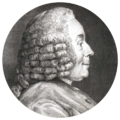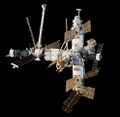Template:Selected anniversaries/February 20: Difference between revisions
No edit summary |
No edit summary |
||
| Line 1: | Line 1: | ||
<gallery> | <gallery> | ||
||1759 | ||1759: Johann Christian Reil born ... physician, physiologist, and anatomist. | ||
||1762 | ||1762: Tobias Mayer dies ... astronomer and academic. Pic. Reflecting circle. | ||
||1771 | ||1771: Jean-Jacques d'Ortous de Mairan dies ... geophysicist and astronomer. | ||
File:Jean-Jacques d'Ortous de Mairan.png|link=Jean-Jacques d'Ortous de Mairan (nonfiction)|1771: Geophysicist, astronomer, and biologist [[Jean-Jacques d'Ortous de Mairan (nonfiction)|Jean-Jacques d'Ortous de Mairan]] dies. His observations and experiments inspired the beginning of what is now known as the study of biological circadian rhythms. | File:Jean-Jacques d'Ortous de Mairan.png|link=Jean-Jacques d'Ortous de Mairan (nonfiction)|1771: Geophysicist, astronomer, and biologist [[Jean-Jacques d'Ortous de Mairan (nonfiction)|Jean-Jacques d'Ortous de Mairan]] dies. His observations and experiments inspired the beginning of what is now known as the study of biological circadian rhythms. | ||
| Line 12: | Line 12: | ||
File:Laura Bassi.jpg|link=Laura Bassi (nonfiction)|1788: Physicist and academic [[Laura Bassi (nonfiction)|Laura Bassi]] dies. She was one of the key figures in introducing Newton's ideas of physics and natural philosophy to Italy. | File:Laura Bassi.jpg|link=Laura Bassi (nonfiction)|1788: Physicist and academic [[Laura Bassi (nonfiction)|Laura Bassi]] dies. She was one of the key figures in introducing Newton's ideas of physics and natural philosophy to Italy. | ||
||1792 | ||1792: The Postal Service Act, establishing the United States Post Office Department, is signed by United States President George Washington. | ||
||1844 | ||1844: Ludwig Boltzmann born ... physicist and philosopher ... development of statistical mechanics, which explains and predicts how the properties of atoms (such as mass, charge, and structure) determine the physical properties of matter (such as viscosity, thermal conductivity, and diffusion). | ||
||1872 | ||1872: The Metropolitan Museum of Art opens in New York City. | ||
||1901 | ||1901: René Dubos, French-American biologist and author (d. 1982) | ||
||1901 – Louis Kahn, American architect, designed the Salk Institute, the Kimbell Art Museum and the Bangladesh Parliament Building (d. 1974) | ||1901 – Louis Kahn, American architect, designed the Salk Institute, the Kimbell Art Museum and the Bangladesh Parliament Building (d. 1974) | ||
Revision as of 19:41, 24 August 2018
1771: Geophysicist, astronomer, and biologist Jean-Jacques d'Ortous de Mairan dies. His observations and experiments inspired the beginning of what is now known as the study of biological circadian rhythms.
1772: Astronomer, mathematician, and crime-fighter Nicole-Reine Lepaute publishes new set of star charts using Gnomon algorithm functions which give unprecedented accuracy in the measurement of crimes against astronomical constants.
1788: Physicist and academic Laura Bassi dies. She was one of the key figures in introducing Newton's ideas of physics and natural philosophy to Italy.
1947: Mathematician and military intelligence officer Janet Beta privately advises Eleanor Roosevelt that crimes against mathematical constants will only worsen under a military-industrial state of emergency.
1972: Physicist and academic Maria Goeppert-Mayer dies. She developed a mathematical model for the structure of nuclear shells, for which she was awarded the Nobel Prize in Physics in 1963, which she shared with J. Hans D. Jensen and Eugene Wigner.
1986: The Soviet Union launches its Mir spacecraft. Remaining in orbit for 15 years, it is occupied for ten of those years.
1986: New channel features Fantasy Voronoi diagrams based on the probability of the Soviet spacecraft Mir spacecraft contacting AESOP or other artificial intelligence.







